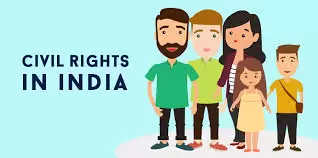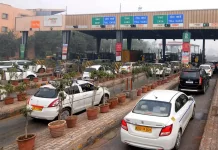The following are some of the important civil rights.
Right of Life
It is the most fundamental of all civil rights. Man must live first before he can do anything. The State must make adequate provision for the personal safety of its citizens. This right also implies the right to self-defense and prevention of suicide.
Right to Liberty
This right implies free movement. Every citizen has complete freedom to move within the State. None can be detained arbitrarily without trial and there must be provision for redress of wrongful arrest: In India if anybody is arrested by the government, he must be ordinarily put before the nearest magistrate within 24 hours of his arrest.
Right to Property
Property in democracy is regarded as a sacred institution. It creates a sense of possession and an incentive to work. It is reward for one’s ability and is essential for the good of man and society. Machiavelli once said, “Man may forget the murder of his father but he will never forget the loss of his property”. The communists, of course, advocate the abolition of property. However, all democratic States guarantee this right to their citizens.
Right to Contract
The right to contract means that every citizen can live, work, earn and freely contract on the basis of equality with other citizens. Contract is a mutual agreement between two or more parties imposing some obligations on each other. This contract is the essential basis of society.
Right to Freedom of Speech
Right to freedom of speech is a primary necessity of man. There can be no society unless its members are free to express their opinion and exchange their views without restraints. The citizens have, therefore, the right to freely criticize the policies and actions of authorities.
Freedom of Press
The right to freedom of press is closely associated with right to freedom speech. It means the right to publish what a man can lawfully speak. Opinion of the citizens can be published in newspaper and pamphlets. Newspapers are the most powerful organ in modern democracy to mould public opinion. Free discussions and criticisms are essential for the success of democracy.
Right to Form Association
Man lives in group and forms associations. He has different aspects of life and each aspect may be represented in an association. This is what is called the “split” personality of man. The State is regarded as a political association. However, it is not the only association in the society. There are other associations like cultural, educational, philanthropic and religious associations in a society. Men have right to form associations.
Right to Religion and Conscience
Religion is deeply rooted in the nature of man. An individual should be free to follow any religion he likes. He should have complete liberty of belief and worship. The State has nothing to do with the religions of citizens. Many of the modern States are, therefore, secular States.
Right to Culture and Language
Every citizen will follow and develop his own culture and language. The minorities in a democracy should be allowed to protect their rights and privileges. In the Indian Constitution, there is provision for educational and cultural rights. A citizen in India is allowed to preserve his language, script and culture. He is also free to be admitted in any educational institution situated in the country.
Right to Equality
It means the absence of legal discrimination against any individual, group, class or race. All should be equal in the eyes of law and all should get equal protection of law. The State should not discriminate against any citizen on grounds of religion, race, language, caste or sex. Right to Equality is a fundamental right in the Indian Constitution.
Right to Family
The last but not the least, is the right to family. The family system brings some social virtues in man. Family is often called the “cradle of civic virtues”. The right to family is therefore, one of the elementary rights and it provides for the fight to marriage, the right to maintain the purity of such marriage, the right to custody and control of children and the right of inheritance.
These are some of the important civil rights of a citizen in a modern State. These rights are not absolute. They can be restricted for the interest of the State. Even the rights to life, liberty and property are restricted by the state during war and emergency. During the time of war and emergency, it is the duty of all citizens to protect and uphold the sovereignty of the State, even if they have to sacrifice their lives.
source:ncib.in














I would like to say about right to equality.
I don’t think it is followed completely.
Iam Sikh and I was not given right to register my marriage as Sikh, instead I have to register it under Hindu Marriage, which i didn’t do. So is govt following Right to Equality here?
We believe we should have Sikh marriage act. Under which every Sikh can register their marriages going forward.
Thanks,
Sardar Jaspal singh
There is nothing in Guru Granth Saahib that differentiates Sikhs from Hindus as if they are of different religions. All the ten Gurus sacrificed their lives and fought for protection of Hinduism, for preventing the conversion of Hindus. So, on what basis anyone can claim that Sikhs and Hindus are different ?
MATA PITA JI KI JAY GOD SE KEYA KAAM HAI USA GOVERNMENT VAH HAMARE MATA PITA JI HAI AS KING KULDEEP KUMAR 9661110760 KK25022@GMAIL.COM PIN COD 843118
Despite having worked for several years in an govt. office,no botheration results from the officials in order to result as confirmation for contractual employees.This is despite having worked sincerely by some of them.Load of work is equivalent for contractual and permanent employees.Contractual Employees are given much lesser salary and the expensiveness has increased much more for everybody.The other benefits including medical advantages plus more number of leaves are also not being given to the contractual employees. An analysis can also be made from the Biometric Attendance System,since the time it resulted.
What about our responsibilities towards keeping the nation as one. Noonebtslks about this.
There is nothing in Guru Granth Saahib that differentiates Sikhs from Hindus as if they are of different religions. All the ten Gurus sacrificed their lives and fought for protection of Hinduism, for preventing the conversion of Hindus. So, on what basis anyone can claim that Sikhs and Hindus are different ?
Well I like what you said,As a junior i want some suggestion. Check my video.Thanks http://ceesty.com/wmofVm
Wohh precisely what I was searching for, regards for putting up.
Comments are closed.